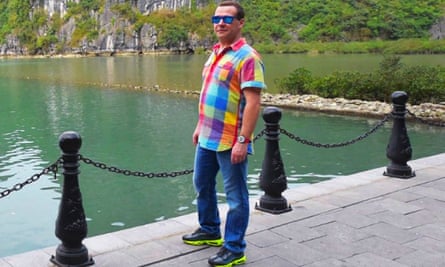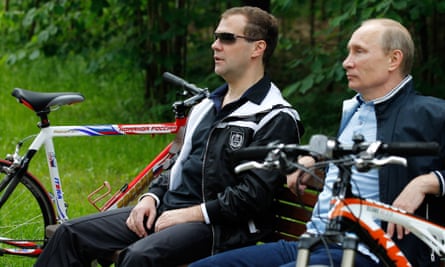The street protests that swept Russian cities over the weekend were remarkable not just for their unusually large size, but also for their main target: Dmitry Medvedev.
After an investigation by the anti-corruption campaigner and opposition politician Alexei Navalny alleged a network of palaces and vineyards linked to Medvedev, the prime minister has become the focal point of the protests. Angry Russians carried rubber ducks, a mocking reference to a shelter for ducks found on one of his alleged properties.
Medvedev, who spent four years as president between 2008 and 2012, has long been considered by much of the opposition as a relatively decent member of Putin’s inner circle. But his trajectory over the past decade reflects the evolution and eventual crushing of hopes that Vladimir Putin’s system might gradually reform from within, and evolve into something more liberal.
Medvedev, who has known the Russian president since 1991, also grew up in Leningrad, now St Petersburg, but their backgrounds were very different. While Putin was working for the KGB, Medvedev was a teenager dreaming of owning Pink Floyd’s The Wall and Wrangler jeans. In interviews, he recalled work sweeping snow from the streets while he studied, and he later married his childhood sweetheart, Svetlana.
He used Twitter, surrounded himself with relative liberals, and said things like “freedom is better than non-freedom” as he campaigned for the 2008 presidential election – in which he had long before secured the one vote that mattered: Putin’s.
In short, he seemed like a decent, progressive man who sympathised with the aspirations of Russia’s growing middle class. Although it was obvious that Putin, who moved aside to be prime minister, still held more power, there was real hope that with time Medvedev might grow into a genuine political force.

The Russian journalist Mikhail Zygar, in his recent book about Putin’s inner circle, described Medvedev’s uneasy manner as that of “a rookie teacher unsure of what reaction he will get on entering the classroom for the first time”.
When Medvedev tried to dress or talk like Putin, donning bomber jackets or aspirating his consonants in the style of his mentor, the effects were more comic than threatening.
But it was partly for this reason that many liberals placed their hopes in Medvedev. The very fact that he looked so awkward in his own skin, and seemed like a regular guy – rather than one of the humourless ex-KGB droids who made up so much of the Kremlin inner circle – allowed people to hope he might be able to effect incremental change over time.
But in autumn 2011, Putin announced he would move back to the Kremlin and Medvedev became prime minister again.
“To be honest, I think even Putin was a bit disappointed in Medvedev. He was hoping he might be able to eventually step aside, but he saw Medvedev wasn’t up to the task,” one source close to the Kremlin claimed.
Medvedev accepted the demotion quietly, though rumours he had fallen into depression swirled around Moscow. At a meeting with the leaders of parliamentary parties shortly after, he was saucer-eyed and looked like he might burst into tears at any moment.
“For a while it was very difficult for him to readapt to being prime minister, though after a while he seemed to be happy enough,” said another source close to the Kremlin.
After the annexation of Crimea and the war in east Ukraine in 2014, western sanctions and falling oil prices meant life got significantly harder for many Russians. As Putin grabbed the credit for Russia’s new assertiveness on the world stage, Medvedev took the hit for the miserable economic situation at home.
With time, Medvedev’s gaffes seemed embarrassing rather than charming. He was taunted mercilessly on social media, where he was attributed the hashtag “pathetic”.
His spokeswoman, Natalya Timakova, said Medvedev became upset after reading comments left for him on social media, and complained that people thought it acceptable to call him Dimon, a flippant diminutive of Dmitry. “He’s not Dimon to you, he’s the prime minister,” she said, angrily.

At the height of Ukraine’s Maidan protests in 2014, he called on Ukraine’s then president Viktor Yanukovych not to be “a rag on which people are wiping their feet”. If Putin had said it, it would have sounded vicious and pithy; when Medvedev said it, it sounded more like projection.
His previous, almost charming awkwardness now seemed more like political tone-deafness. He was repeatedly filmed snoozing through major events, including the spectacular opening ceremony of the 2014 Winter Olympics in Sochi, Russia.
Asked by an emotional teacher why salaries were so low, Medvedev jovially suggested that if teachers wanted to earn good money, they should go into business instead. When he was accosted by angry pensioners in annexed Crimea demanding to know why the government had not indexed pensions, he retorted: “There isn’t any money! But hang in there. All the best to you,” before walking off.
Such remarks appear newly distasteful in light of the allegations in Navalny’s film. If even some of them are true, they suggest Medvedev has amassed a huge empire of property and assets, albeit held by friends and through proxy trusts.
“He’s not Dimon at all ... he’s one of the most corrupt people in the country,” said Navalny in his video.
Medvedev has made no official comment on the allegations. On Sunday, the day of the protest, he wrote on his Instagram account that his day had been “not bad” as he had gone skiing.
Paradoxically, his position is likely to have been made safe by the wave of protest. Rumours that his days as prime minister are numbered have been doing the rounds for years, and six months ago there was renewed chatter that Putin could remove him. But the Kremlin will not want to appear to be succumbing to Navalny’s agenda.
“Putin trusts Medvedev fully, he’s a 100% tested product. And now, even more so he’s unlikely to fire him, his position is more solid than ever,” said one of the sources close to the Kremlin.
